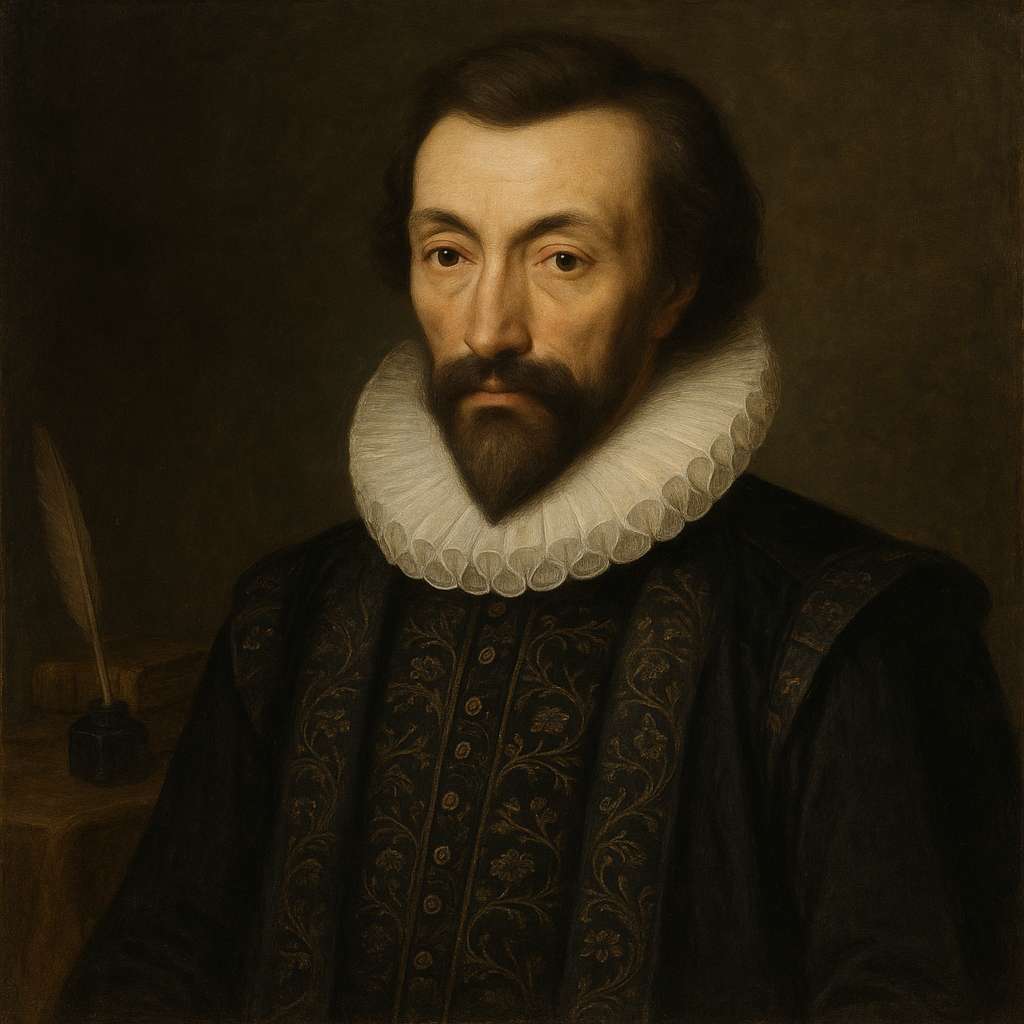A Feaver
John Donne
1572 to 1631

Oh doe not die, for I shall hate
All women so, when thou art gone,
That thee I shall not celebrate,
When I remember, thou wast one.
But yet thou canst not die, I know;
To leave this world behinde, is death,
But when thou from this world wilt goe,
The whole world vapors with thy breath.
Or if, when thou, the worlds soule, go'st,
It stay, 'tis but thy carkasse then,
The fairest woman, but thy ghost,
But corrupt wormes, the worthyest men.
O wrangling schooles, that search what fire
Shall burne this world, had none the wit
Unto this knowledge to aspire,
That this her feaver might be it?
And yet she cannot wast by this,
Nor long beare this torturing wrong,
For much corruption needfull is
To fuell such a feaver long.
These burning fits but meteors bee,
Whose matter in thee is soone spent.
Thy beauty, and all parts, which are thee,
Are unchangeable firmament.
Yet 'twas of my minde, seising thee,
Though it in thee cannot perséver;
For I had rather owner bee
Of thee one houre, then all else ever.
John Donne's A Feaver
John Donne’s A Feaver is a compelling exploration of love, mortality, and metaphysical paradox. Written in the early 17th century, the poem exemplifies Donne’s characteristic wit, intellectual rigor, and emotional intensity. At its core, A Feaver grapples with the speaker’s desperate plea for his beloved’s survival, interwoven with metaphysical conceits that elevate the personal to the cosmic. The poem’s tension between physical decay and spiritual permanence reflects Donne’s broader preoccupations with love, death, and the soul’s transcendence.
This analysis will examine A Feaver through multiple lenses: its historical and biographical context, its metaphysical conceits, its thematic concerns, and its emotional resonance. By situating the poem within Donne’s oeuvre and the broader literary landscape of the Renaissance, we can appreciate its intricate interplay of passion and intellect.
Historical and Biographical Context
John Donne (1572–1631) wrote during a period of profound religious and philosophical upheaval. The Renaissance’s revival of classical thought, coupled with the Reformation’s theological disputes, shaped Donne’s intellectual milieu. His early poetry, including A Feaver, belongs to his "secular" phase, before his ordination as an Anglican priest in 1615. These early works often explore love—both sacred and profane—with a blend of eroticism and philosophical depth.
Donne’s personal life also informs A Feaver. His clandestine marriage to Anne More in 1601 led to professional ruin, and their relationship was marked by both deep affection and tragedy (Anne died in 1617 after bearing twelve children). While A Feaver does not explicitly reference Anne, its tone of desperate attachment suggests the intensity of Donne’s emotional bonds. The poem’s fear of loss may reflect broader anxieties about mortality, a theme that would later dominate his Holy Sonnets.
Metaphysical Conceits and Imagery
A hallmark of Donne’s poetry is the metaphysical conceit—an extended metaphor that yokes together seemingly disparate ideas. A Feaver employs several such conceits, blending the corporeal with the cosmic.
The opening stanza introduces the speaker’s hyperbolic declaration that if his beloved dies, he will "hate / All women so." This exaggeration underscores his despair, framing her as irreplaceable. The subsequent lines introduce a metaphysical twist: her death would not merely be a personal loss but a cosmic dissolution. When he claims that "the whole world vapors with thy breath," he suggests that her existence sustains reality itself. This idea echoes Renaissance Neoplatonism, where the beloved’s beauty reflects divine harmony.
The third stanza intensifies this conceit by presenting the beloved as the "worlds soule." If she departs, the world becomes a lifeless "carkasse," and even the "fairest woman" is merely her ghost. This imagery evokes the medieval memento mori tradition, where beauty is fleeting, and physical decay is inevitable. Yet Donne subverts this tradition by insisting that his beloved’s essence is immutable—her beauty is an "unchangeable firmament," transcending mortal decay.
The poem’s central paradox lies in its treatment of the fever. The speaker initially fears it as a mortal threat, yet by the fourth stanza, he entertains the heretical notion that her fever might be the apocalyptic fire predicted by "wrangling schooles" (a likely reference to theological debates about the end of the world). This audacious comparison elevates her illness to cosmic significance, suggesting that her suffering is of eschatological magnitude.
Themes: Love, Mortality, and Transcendence
At its heart, A Feaver is a meditation on the tension between earthly love and eternal permanence. The speaker oscillates between terror at his beloved’s potential death and confidence in her indestructibility. This duality reflects Donne’s broader exploration of love as both a physical and spiritual force.
1. The Fear of Loss
The poem’s opening lines convey visceral dread: "Oh doe not die, for I shall hate / All women so." The speaker’s anguish is palpable, revealing love’s capacity to distort perception—if she dies, all women become hateful by comparison. This sentiment recalls Petrarchan conventions, where the beloved’s absence renders the world desolate. Yet Donne pushes beyond Petrarchan idealism by grounding his despair in metaphysical speculation.
2. The Body and the Soul
Donne’s treatment of the body’s fragility versus the soul’s permanence is central to the poem. The fever, a physical ailment, threatens to consume the beloved, yet the speaker insists that her true essence—her beauty and virtue—is incorruptible. The lines "Thy beauty, and all parts, which are thee, / Are unchangeable firmament" suggest a Platonic ideal, where her true self exists beyond material decay.
This duality reflects Donne’s broader theological concerns. In his later religious works, he grapples with the soul’s immortality, and A Feaver anticipates these themes. The fever becomes a metaphor for earthly suffering, while the "firmament" symbolizes divine constancy.
3. Possession and Devotion
The final stanza introduces a poignant admission: the speaker’s love is possessive ("For I had rather owner bee / Of thee one houre, then all else ever"). This declaration encapsulates the tension between human desire for control and the inevitability of loss. The speaker acknowledges that his "mind" cannot fully possess her, yet he clings to even fleeting ownership. This sentiment resonates with Donne’s The Sunne Rising, where the speaker claims that love makes "one little roome, an every where." In both poems, love defies temporal and spatial limits, even as mortality looms.
Emotional Impact and Rhetorical Devices
Donne’s rhetorical mastery amplifies the poem’s emotional weight. His use of imperative verbs ("Oh doe not die") creates urgency, while the shifting tone—from despair to defiance to resignation—mirrors the instability of grief. The poem’s irregular rhythm and enjambment mimic the fever’s erratic pulse, reinforcing the theme of bodily vulnerability.
The paradoxical imagery—fever as both destructive and insignificant, the beloved as mortal yet eternal—heightens the poem’s emotional complexity. The speaker’s logic is at once desperate and profound, revealing love’s power to distort and elevate perception.
Comparative Readings
A Feaver invites comparison with other Donne poems, such as The Canonization and A Valediction: Forbidding Mourning. Like A Feaver, these works explore love’s transcendence over physical separation. However, A Feaver stands out for its raw vulnerability; where A Valediction consoles, A Feaver agonizes.
The poem also resonates with Shakespeare’s sonnets, particularly Sonnet 18 ("Shall I compare thee to a summer’s day?"). Both poets grapple with preserving beauty against time’s ravages, but Donne’s approach is more philosophically daring, intertwining love with cosmology.
Conclusion
A Feaver exemplifies Donne’s ability to fuse passion with intellect, creating a poem that is as emotionally charged as it is intellectually rigorous. Through metaphysical conceits, paradoxical imagery, and a profound meditation on love and mortality, Donne transforms a personal lament into a universal exploration of human fragility and transcendence.
The poem’s enduring power lies in its honesty—the speaker’s fear, longing, and ultimate recognition of love’s limits resonate across centuries. In A Feaver, Donne reminds us that poetry is not merely an art form but a vessel for the most profound human experiences: the terror of loss, the hope of permanence, and the defiant beauty of love in the face of death.
This text was generated by AI and is for reference only. Learn more
Want to join the discussion? Reopen or create a unique username to comment. No personal details required!



Comments
No comments yet. Be the first to comment!